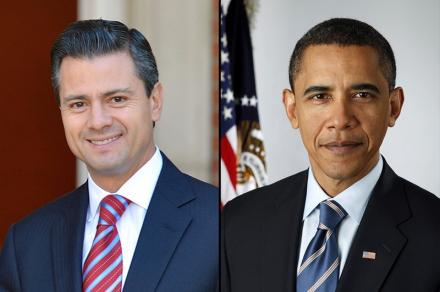 By Monica Ortiz Uribe, KJZZ News for Fronteras
By Monica Ortiz Uribe, KJZZ News for Fronteras
MONTERREY, MEXICO – President Obama travels south today to meet with Mexico’s president, Enrique Peña Nieto. Under this new administration, Mexico wants to shift focus away from fighting drug traffickers to strengthening the economy.
Monterrey is Mexico’s northern industrial metropolis. It’s a city of five million cradled between tall jagged mountains with suffocating traffic and a high cost of living. English is practically a second language here and the United States is like Monterrey’s best friend.
MANUEL MONTOYA: “I think we are good partners…both the American buyers and the Mexican sellers… we are making business in a good way.”
Manuel Montoya directs an alliance of Mexican companies focused on automotives. The auto industry is king in Mexico, 80 percent of the big rig trucks you see on US highways were assembled here. Mexico also supplies the US with parts like windshields, seat belts and steering wheels. Montoya feels it’s time Americans stop identifying Mexico with only violence.
MONTOYA: “They used to treat us like Kabul or like Beirut, you can’t compare, this don’t help to our business.”
Mexico’s new president, Enrique Peña Nieto agrees. In an oped to the Washington Post last November he wrote, “it is a mistake to limit our bilateral relationship to drugs and security concerns.” Instead Mexico’s president wants to focus on binational trade, which in the last 20 years has quintupled to more than a billion dollars a day.
In downtown Monterrey a group of teenage boys in t-shirts and buzz cuts practice a patriotic tune on rusty trumpets. Nearby is the office of another business alliance focused on a rapidly growing industry in Mexico, information technology. Guillermo Safa is the director.
GUILLERMO SAFA: “En caso de Nuevo Leon estamos creciendo el 30 porciento…”
Safa says the IT sector is growing at 30 percent each year. In 2004 the state of Nuevo Leon had 2,000 engineers working in this field. Today that number is 12,000. Globally Mexico is in third place for IT outsourcing.
SAFA: “El resultado de poder hacer crecer la industria TI de Mexico incrementar la riqueza en Mexico y quizas quitar la tentacion de ir a estados unidos a buscar un provenir cuando aqui lo existe.”
Safa says burgeoning industries, like IT, could be an answer to another US/Mexico concern: immigration. He says, the IT sector is producing new opportunities in Mexico that could result in fewer Mexicans going north. He’s even hopeful these new jobs might draw Mexicans already in the United States back home. Call centers, for example, are hiring Mexicans with good English skills and experience in the United States.
Four hours outside Monterrey in the town the Cuatro Cienegas, two sisters prepare bacon wrapped hot dogs near the central plaza. The town is in the state of Coahuila where drug violence is particularly heavy. Ask locals here what they’d like the two presidents to discuss and one answer stands out above the rest.
“Pues sobre la inseguridad.”…”Pues mas que todo la inseguridad”…”Pues de la inseguridad, no?”
‘La inseguridad’, means the insecurity. While this town has been spared from the most horrific violence, news from around the region travels fast: prison breaks, mass shootings and kidnappings. Organized crime still has a strong grip on the country and drug-related killings continue daily. Ruben Perez drives a taxi in Cuatro Cienegas
RUBEN PEREZ: “Ya esta canijo andar en la carretera ya tenemos miedo.”
It’s scary to be out on the road, he says, things are bad. Whether things will improve is anybody’s guess.
Under former President Felipe Calderon, the U.S. was an important partner in the fight against organized crime. U.S. intelligence was behind the arrest of Mexico’s most wanted capos. But under President Peña Nieto things have changed. The new administration has made it clear that when it comes to security matters the U.S. role will be significantly reduced. Whether this new strategy will work for Mexico remains an unanswered question.




